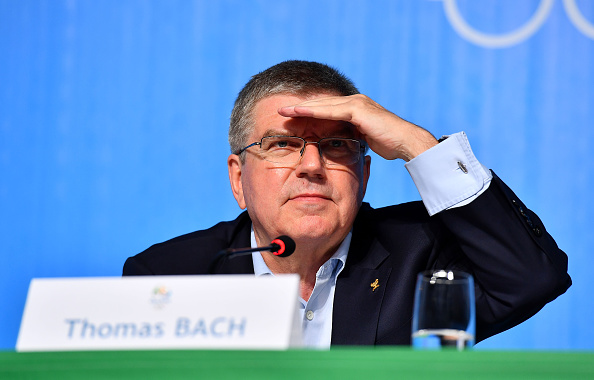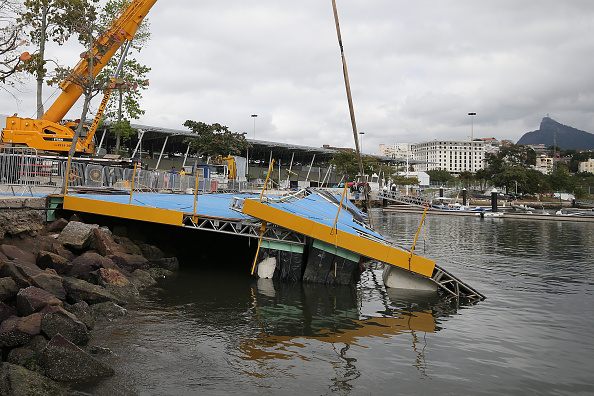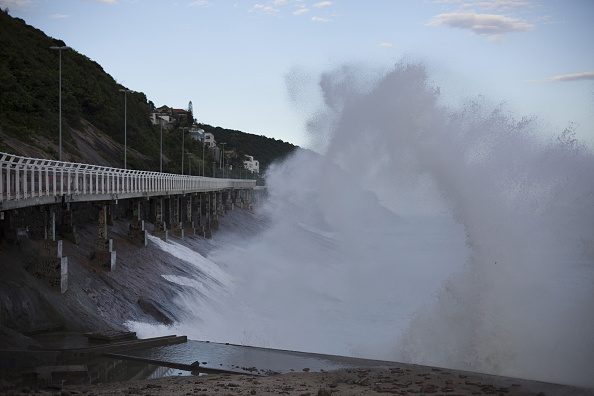RIO DE JANEIRO — Amid the seemingly imminent apocalypse about to erupt with holy fire all over everything connected with the 2016 Summer Games, one might think that the collapse of a boat ramp over the weekend at the sailing venue would be comparatively insignificant.
It’s not.
The ramp collapse is profoundly symptomatic and symbolic.
It underscores the lack of controls — and control — that has dogged preparations for the 2016 Games since the get-go, a long seven years ago.
Of course such a collapse is unacceptable.
Of course it needs to get fixed, and immediately, and a Rio 2016 spokesman says the repairs will take just days.
The boat ramp fail follows the buckling of a seaside bike path here in April. No one was hurt over the weekend at the sailing venue. Two people died when the bike path fell, pulverized by a huge wave. The timing: just hours after the lighting of the Olympic flame in Greece.
Together, these two incidents spotlight the need for a thorough and fundamental review of the very way the International Olympic Committee delegates, assigns and joins with local organizers in getting ready for a Games.
This is way beyond Rio, though Rio should be the catalyst for the wide-ranging discussion that needs to be held about how to bring the organization and operation of a Games into the 21st century.
After Rio, the IOC should convene an “innovation group” — or whatever it wants to call it — made up of forward-thinkers from anywhere. The mandate: new and creative solutions in accord with a reconsideration and reallocation of local and IOC roles and responsibilities. If there are 10 ideas, and nine suck, so what? There needs to be freedom to think out of the box about how to make this, you know, actually work, and without so much drama.
Olympic veterans might recall that during the 2009 bid phase for 2016, Rio didn't even make the initial technical grade but was nonetheless passed through for, um, other reasons. Given that, who can be all that surprised now?
Here is the starting premise for discussion:
The Olympic Games are a multibillion-dollar enterprise.
With that in mind, it is insanity to keep turning over the organization of the IOC’s franchise to newbies, and expect things to run in a world-class manner.
What business does that? Nobody. Well, no one except the IOC.
As Albert Einstein reportedly said, the very definition of insanity is doing the same thing over and over again but expecting different results.
This, though, is exactly what the IOC does. Seven years beforehand, It awards some place a Games. Then it sits back and holds twice- or three-times-per-year inspections — in Olympic jargon, “coordination commissions” — while allowing the locals to run things as the locals see fit.
Typically, this means senior-level management shuffles and re-shuffles and, as well, political or government interference that, to put it gently, is not helpful. Look at Rio. Or the next Games, in Korea in 2018. Or Tokyo, in 2020.
Sometimes, as was the case in Korea, the IOC lucks out and gets someone like Y.H. Cho, the Korean Air chief who ran the winning Korean bid and knew how to maneuver between east and west as well as the elements in Korea itself — business, government, politics.
His case is fully instructive, however: a few months ago, the Koreans opted to go in a different direction. Who was the most surprised when it happened? The IOC.
It doesn’t take Einstein to figure out a fix.
Start with the FIFA approach.
In some IOC circles, the idea that it could learn from FIFA might be considered heresy.
For sure, there are many, many, many things one could observe about FIFA that would not be positive.
But it must be said that FIFA knows how to run its soccer tournaments.
Why?
Because that is what it’s in the business of doing. It runs the show, thank you.
Same idea for the IOC, and the Olympics.
The IOC should have a Games team — or teams, Winter and Summer — who go from locale to locale. How many people? Unclear. Six? Ten? Twenty? Whatever.
All of this can be imagined in a way that actually jibes with Agenda 2020, the IOC's self-proclaimed 2014 reform plan, and easily. Agenda 2020 can be the blueprint, in the same way that the U.S. Congress passes laws that then need rules and regulation -- back to the Olympic context, whatever the "innovation group" comes up with -- to implement.
Will there be conflict with the locals? Undoubtedly. Might the locals resent the IOC influence? Probably. Are these kinds of things capable of solution? Absolutely, and this is why the rights and responsibilities should be examined anew, now.
Indeed, in other areas, the IOC has already recognized the issue, and done what needs doing, what is elegantly obvious — assign a cadre of professional experts to run things.
The Olympic Broadcasting Service, which supplies the video and more for each edition of the Games? They are maybe the best in the world, based in Madrid under the uber-competent Yiannis Exarchos, in charge of the host feed and more from Games to Games.
On a smaller scale — and this is something of inside baseball but the point is the same — each Games features a service for the media called Olympic News Service. In London four years ago, ONS ran to more than 500 people. Here, after a thorough review (disclaimer: I was invited to be part of the working group involved in that review), more like 50, all professionals.
What does this save? Time, resource and, crucially, money.
Let’s be totally frank:
You know the old saying about stuff flowing downhill?
Which entity, more than any, is the one at the bottom of that proverbial Olympic hill? The local organizing committee, which has a temporary lifespan? Or the IOC, which endures and thus makes itself the fat, easy target?
Since that is so clearly the case, why wouldn’t the IOC take proactive steps to ensure the ongoing integrity, vitality and relevance of its brand — instead of being subjected every two years to the predictable sky-is-falling reportage?
The IOC actually has a great story to tell: no other institution in the world brings thousands of people together in a celebration intended to promote the best of each and all of us.
Far too often, however, that message gets obscured by, or lost in, too much of the stuff running downhill.
When you think of Sochi, as a for instance, what are the two things that come immediately to mind for most people? Well, now three, given allegations of state-sanctioned Russian doping — one, the hotels not being done when multitudes of reporters arrived and, two, the $51 billion overall cost associated with those Games, right?
It’s now five short days before the 2016 opening ceremony. This week the bulk of roughly 15,000 media people are going to descend upon Rio.
You can believe that there is still painting, wiring, hanging, building all over the place.
Reports from the press already here of imminent disaster are now so widespread that there has developed in recent days a Reddit subgroup called apocalympics2016.
Truth:
Fire, hail, locusts, frogs, cattle disease — these and the other plagues from the Biblical Exodus— are nowhere in evidence in Rio. As the sages teach, this is welcome news indeed for those of us who are first-born males.
As for bugs: now that Zika is in Florida, it might even be asked if there is quite another reason so many of the top male golfers aren’t here. Like: drug testing, maybe?
There is one overriding problem in Rio, and one problem only:
There is not — and has not been — enough money.
The problem is both overall budget, and cash flow.
The organizing committee’s operating budget figures out at about $2.3 billion.
The shortfall, now, is reportedly about $70 million.
Amid a severe economic depression, that kind of money literally isn’t here to be had in Brazil.
But it’s got to come from somewhere.
This is why the IOC president Thomas Bach, at a news conference Sunday marking the end of the policy-making executive board’s pre-Games get-together, announced the IOC would be stepping in to help — though he did not detail by how much, instead saying the IOC "is helping the organizing committee to make sure that these Games will be the success we all want it to be.”
The back story of these Games is that the IOC recognized the enormity and complexity of the Rio challenge in 2014, when it assigned the-then Games executive director, Gilbert Felli, to work more or less full time on 2016 preparations.
Thus it has been running on either — choose your perspective — an ad hoc or emergency basis the very solution that must present itself looking ahead to Pyeongchang 2018, Tokyo 2020 and beyond.
Let's face it: chronic triage is a bad way to go through life.




